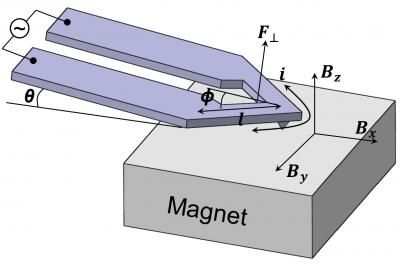Magnetic actuation enables nanoscale thermal analysis
Heated nanoprobes perform thermo-mechanical measurements using magnetic actuation
Polymer nano-films and nano-composites are used in a wide variety of applications from food packaging to sports equipment to automotive and aerospace applications. thermal analysis is routinely used to analyze materials for these applications, but the growing trend to use nanostructured materials has made bulk techniques insufficient.

This is the atomic force microscope with an integrated heater actuated using Lorentz forces.
William King
In recent years an atomic force microscope-based technique called nanoscale thermal analysis (nanoTA) has been employed to reveal the temperature-dependent properties of materials at the sub-100 nm scale. Typically, nanothermal analysis works best for soft polymers. Researchers at the University of Illinois at Urbana-Champaign and Anasys Instruments, Inc. have now shown that they can perform nanoscale thermal analysis on stiff materials like epoxies and filled composites.
"This new technique lets us measure temperature and frequency-dependent properties of materials rapidly over a wide bandwidth," noted William King, the College of Engineering Bliss Professor in the Department of Mechanical Science and Engineering at Illinois, who led the research. The technique works by flowing a current around the U-shaped arms of a self-heating atomic force microscope (AFM) cantilever and interacting that current with a magnetic field. The magnetic field allows the tip-sample force to be modulated right near the tip of the AFM.
"We are able to achieve nanometer-scale force control that is independent from the heating temperature," according to Byeonghee Lee, first author of the paper.
"Conventional nanothermal analysis has struggled with highly filled, highly crosslinked materials and sub-100 nm thin films. This new technique has allowed us to reliably measure and map glass transitions and melting transions on classes of materials that were previously very challenging," said Craig Prater, chief technology officer at Anasys Instruments and co-author on the paper.
Original publication
Other news from the department science

Get the analytics and lab tech industry in your inbox
By submitting this form you agree that LUMITOS AG will send you the newsletter(s) selected above by email. Your data will not be passed on to third parties. Your data will be stored and processed in accordance with our data protection regulations. LUMITOS may contact you by email for the purpose of advertising or market and opinion surveys. You can revoke your consent at any time without giving reasons to LUMITOS AG, Ernst-Augustin-Str. 2, 12489 Berlin, Germany or by e-mail at revoke@lumitos.com with effect for the future. In addition, each email contains a link to unsubscribe from the corresponding newsletter.

























































